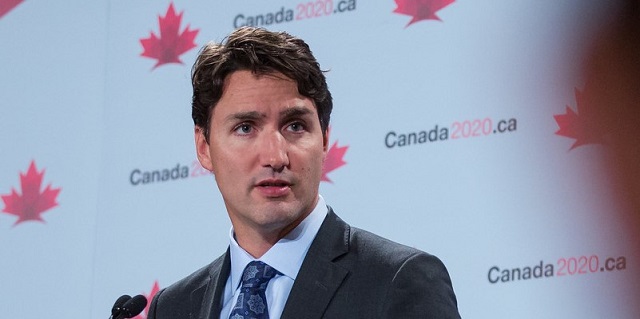Economy
Prime minister’s misleading capital gains video misses the point

From the Fraser Institute
By Jake Fuss and Alex Whalen
According to a 2021 study published by the Fraser Institute, 38.4 per cent of those who paid capital gains taxes in Canada earned less than $100,000 per year, and 18.3 per cent earned less than $50,000. Yet in his video, Prime Minister Trudeau claims that his capital gains tax hike will affect only the richest “0.13 per cent of Canadians”
This week, Prime Minister Trudeau released a video about his government’s decision to increase capital gains taxes. Unfortunately, he made several misleading claims while failing to acknowledge the harmful effects this tax increase will have on a broad swath of Canadians.
Right now, individuals and businesses who sell capital assets pay taxes on 50 per cent of the gain (based on their full marginal rate). Beginning on June 25, however, the Trudeau government will increase that share to 66.7 per cent for capital gains above $250,000. People with gains above that amount will again pay their full marginal rate, but now on two-thirds of the gain.
In the video, which you can view online, the prime minister claims that this tax increase will affect only the “very richest” people in Canada and will generate significant new revenue—$20 billion, according to him—to pay for social programs. But economic research and data on capital gains taxes reveal a different picture.
For starters, it simply isn’t true that capital gains taxes only affect the wealthy. Many Canadians who incur capital gains taxes, such as small business owners, may only do so once in their lifetimes.
For example, a plumber who makes $90,000 annually may choose to sell his business for $500,000 at retirement. In that year, the plumber’s income is exaggerated because it includes the capital gain rather than only his normal income. In fact, according to a 2021 study published by the Fraser Institute, 38.4 per cent of those who paid capital gains taxes in Canada earned less than $100,000 per year, and 18.3 per cent earned less than $50,000. Yet in his video, Prime Minister Trudeau claims that his capital gains tax hike will affect only the richest “0.13 per cent of Canadians” with an “average income of $1.4 million a year.”
But this is a misleading statement. Why? Because it creates a distorted view of who will pay these capital gains taxes. Many Canadians with modest annual incomes own businesses, second homes or stocks and could end up paying these higher taxes following a onetime sale where the appreciation of their asset equals at least $250,000.
Moreover, economic research finds that capital taxes remain among the most economically damaging forms of taxation precisely because they reduce the incentive to innovate and invest. By increasing them the government will deter investment in Canada and chase away capital at a time when we badly need it. Business investment, which is crucial to boost living standards and incomes for Canadians, is collapsing in Canada. This tax hike will make a bad economic situation worse.
Finally, as noted, in the video the prime minister claims that this tax increase will generate “almost $20 billion in new revenue.” But investors do not incur capital gains taxes until they sell an asset and realize a gain. A higher capital gains tax rate gives them an incentive to hold onto their investments, perhaps until the rate is reduced after a change in government. According to economists, this “lock-in” effect can stifle economic activity. The Trudeau government likely bases its “$20 billion” number on an assumption that investors will sell their assets sooner rather than later—perhaps before June 25, to take advantage of the old inclusion rate before it disappears (although because the government has not revealed exactly how the new rate will apply that seems less likely). Of course, if revenue from the tax hike does turn out to be less than anticipated, the government will incur larger budget deficits than planned and plunge us further into debt.
Contrary to Prime Minister Trudeau’s claims, raising capital gains taxes will not improve fairness. It’s bad for investment, the economy and the living standards of Canadians.
Authors:
2025 Federal Election
Three cheers for Poilievre’s alcohol tax cut

By Franco Terrazzano
The Canadian Taxpayers Federation applauds Conservative Party Leader Pierre Poilievre’s commitment to end and reverse the alcohol escalator tax.
“Poilievre just promised major alcohol tax cuts and taxpayers will cheers to that,” said Franco Terrazzano, CTF Federal Director. “Poilievre’s tax cut will save Canadians money every time they have a cold one with a buddy or enjoy a glass of Pinot with their better half and it will give Canadians brewers, distillers and wineries a fighting chance against tariffs.”
Today, federal alcohol taxes increased by two per cent, costing taxpayers about $40 million this year, according to Beer Canada.
Poilievre announced a Conservative government “will axe the escalator tax on wine, beer and spirits back to 2017 levels, ending the automatic annual tax increases.”
The alcohol escalator tax has automatically increased excise taxes on beer, wine and spirits every year, without a vote in Parliament, since 2017. The alcohol escalator tax has cost taxpayers more than $900 million since being imposed, according to Beer Canada.
Taxes from multiple levels of government account for about half of the price of alcohol.
Meanwhile, tariffs are hitting the industry hard. Brewers have described the tariffs as “Armageddon for craft brewing.”
“Automatic tax hikes are undemocratic, uncompetitive and unaffordable and they need to stop,” Terrazzano said. “If politicians think Canadians aren’t paying enough tax, they should at least have the spine to vote on the tax increase.
“Poilievre is right to end the escalator tax and all party leaders should commit to making life more affordable for Canadian consumers and businesses by ending the undemocratic alcohol tax hikes.”
Business
Saskatchewan becomes first Canadian province to fully eliminate carbon tax

From LifeSiteNews
Saskatchewan has become the first Canadian province to free itself entirely of the carbon tax.
On March 27, Saskatchewan Premier Scott Moe announced the removal of the provincial industrial carbon tax beginning April 1, boosting the province’s industry and making Saskatchewan the first carbon tax free province.
Under Moe’s direction, Saskatchewan has dropped the industrial carbon tax which he says will allow Saskatchewan to thrive under a “tariff environment.”
“I would hope that all of the parties running in the federal election would agree with those objectives and allow the provinces to regulate in this area without imposing the federal backstop,” he continued.
The removal of the tax is estimated to save Saskatchewan residents up to 18 cents a liter in gas prices.
The removal of the tax will take place on April 1, the same day the consumer carbon tax will reduce to 0 percent under Prime Minister Mark Carney’s direction. Notably, Carney did not scrap the carbon tax legislation: he just reduced its current rate to zero. This means it could come back at any time.
Furthermore, while Carney has dropped the consumer carbon tax, he has previously revealed that he wishes to implement a corporation carbon tax, the effects of which many argued would trickle down to all Canadians.
The Saskatchewan Association of Rural Municipalities (SARM) celebrated Moe’s move, noting that the carbon tax was especially difficult on farmers.
“I think the carbon tax has been in place for approximately six years now coming up in April and the cost keeps going up every year,” SARM president Bill Huber said.
“It puts our farming community and our business people in rural municipalities at a competitive disadvantage, having to pay this and compete on the world stage,” he continued.
“We’ve got a carbon tax on power — and that’s going to be gone now — and propane and natural gas and we use them more and more every year, with grain drying and different things in our farming operations,” he explained.
“I know most producers that have grain drying systems have three-phase power. If they haven’t got natural gas, they have propane to fire those dryers. And that cost goes on and on at a high level, and it’s made us more noncompetitive on a world stage,” Huber decalred.
The carbon tax is wildly unpopular and blamed for the rising cost of living throughout Canada. Currently, Canadians living in provinces under the federal carbon pricing scheme pay $80 per tonne.
-

 2025 Federal Election2 days ago
2025 Federal Election2 days agoPoilievre, Conservatives receive election endorsement from large Canadian trade union
-

 2025 Federal Election2 days ago
2025 Federal Election2 days agoRCMP Confirms It Is ‘Looking Into’ Alleged Foreign Threat Following Liberal Candidate Paul Chiang Comments
-

 2025 Federal Election2 days ago
2025 Federal Election2 days agoLondon-Based Human Rights Group Urges RCMP to Investigate Liberal MP for Possible Counselling of Kidnapping
-

 2025 Federal Election23 hours ago
2025 Federal Election23 hours agoMark Carney refuses to clarify 2022 remarks accusing the Freedom Convoy of ‘sedition’
-

 Business2 days ago
Business2 days agoBiden’s Greenhouse Gas ‘Greendoggle’ Slush Fund Is Unraveling
-

 2025 Federal Election1 day ago
2025 Federal Election1 day agoPM Carney’s Candidate Paul Chiang Steps Down After RCMP Confirms Probe Into “Bounty” Comments
-

 Censorship Industrial Complex2 days ago
Censorship Industrial Complex2 days agoFrance condemned for barring populist leader Marine Le Pen from 2027 election
-

 2025 Federal Election1 day ago
2025 Federal Election1 day agoLiberal MP Paul Chiang Resigns Without Naming the Real Threat—The CCP








